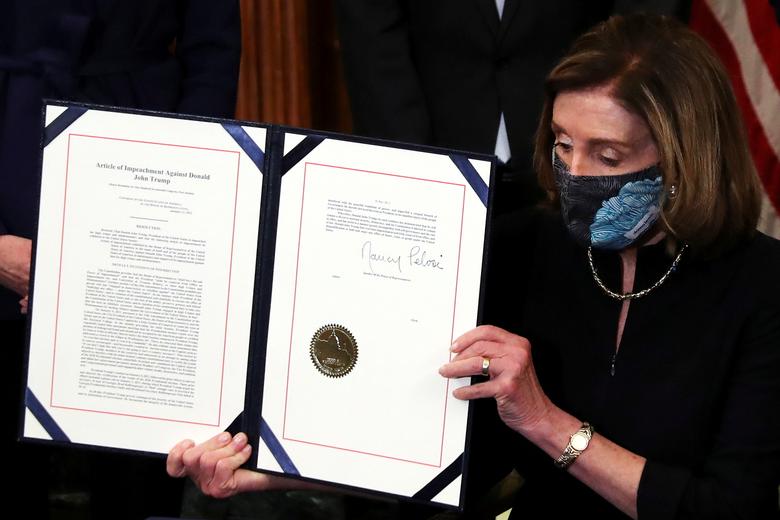WASHINGTON, D.C. — The U.S. Senate will meet next week, just as Joe Biden is inaugurated as president, to begin its impeachment trial of outgoing President Trump.
Trump is now the first president in U.S. history to be impeached twice. House Speaker Nancy Pelosi (D-CA) brought the impeachment to a vote just a week after Trump’s supporters rampaged the U.S. Capitol during the confirmation of Biden’s electoral victory. Trump is accused of using his bully pulpit to encourage some of his violent supporters to besiege the Capitol, leading to five deaths, including a police officer.
The timing of the House Democrats’ impeachment effort means the Senate will not have enough time to hold a trial, let alone convict Trump of the charge of “incitement of insurrection”, that could oust him before he officially leaves office on Jan. 20.
The next Senate session is set for Jan. 19, though the actual trial will not begin till after inauguration. Senate Majority Leader Mitch McConnell (R-KY), who has been furious with Trump over his reckless behavior, has refused to bring the Senate to session early, though that still would not have meant enough time to prematurely end Trump’s term.
“Even if the Senate process were to begin this week and move promptly, no final verdict would be reached until after President Trump had left office,” McConnell said in a statement Wednesday. “This is not a decision I am making; it is a fact.”
While the press has been full of speculation, I have not made a final decision on how I will vote and I intend to listen to the legal arguments when they are presented to the Senate — Mitch McConnell
It is not clear whether McConnell will vote to convict at the conclusion of the trial.
“While the press has been full of speculation, I have not made a final decision on how I will vote and I intend to listen to the legal arguments when they are presented to the Senate,” he said.
Ten Republicans joined House Democrats to vote to impeach Trump on Wednesday, while others refused, saying Trump’s remarks were protected by the First Amendment of the U.S. Constitution.
Article I, Section 3 of the U.S. Constitution says an impeachment trial can cause both “removal from office and disqualification to hold and enjoy any office of honor”, showing that though Trump will have already left office, Congress can still block him from running in the future (of the eight officers the Senate has voted to remove thus far, it only voted to disqualify three of them). This means disqualifying Trump from running for president in the future can be taken up by vote after a conviction, if such a conviction happens.

House Speaker Nancy Pelosi shows the article of impeachment against President Trump after signing it in an engrossment ceremony at the U.S. Capitol, Jan 13. Photo: Leah Millis
The Senate needs a two-thirds majority to convict, meaning all Democrats and 17 Republicans will have to cast a “guilty” vote, not an easy task. Only a handful of Senate Republicans have indicated a willingness to entertain conviction. If McConnell backs conviction, he could convince others in his party, an act that would forever tarnish Trump’s political legacy.
Trump, who is banned from tweeting himself, said in a video on the White House twitter page Wednesday that he condemned the violence of Jan. 6, but has not admitted to fairly losing the election, the prime element behind his supporters’ anger.






Leave a Reply